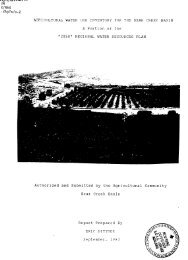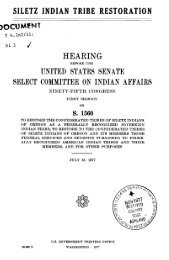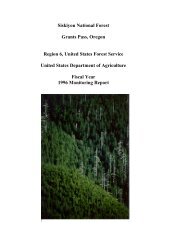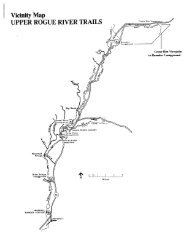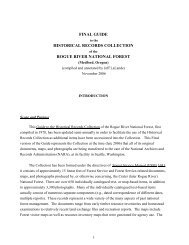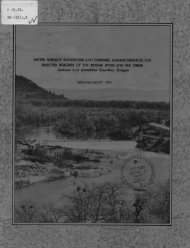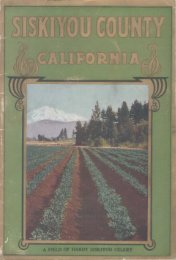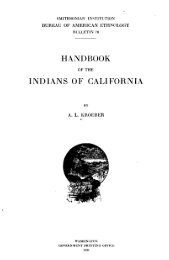Jesse Applegate; Pioneer and State Builder - Southern Oregon ...
Jesse Applegate; Pioneer and State Builder - Southern Oregon ...
Jesse Applegate; Pioneer and State Builder - Southern Oregon ...
Create successful ePaper yourself
Turn your PDF publications into a flip-book with our unique Google optimized e-Paper software.
a fine tract of l<strong>and</strong> in the Osage Valley <strong>and</strong> made his home there asa farmer <strong>and</strong> stock raiser for twelve years, but he continued to act asdeputy-surveyor also during the greater part if not the whole of thattime. In 1843 he carried his trusty compass to the western shore ofthe continent <strong>and</strong> at once resumed its use in a significant service coveringalmost forty years.The interest in <strong>Oregon</strong> had widened <strong>and</strong> intensified since <strong>Applegate</strong>first met the mountain traders at the Green Tree Tavern, <strong>and</strong> sourcesof information about the country had multiplied. <strong>Oregon</strong> was no longer,as it once had been, the object of desire to exploiters of furs only, butwas coming to be regarded as a practicable field of operations for agriculturalpioneers. The forerunners of that class, like the "long hunters"of Kentucky seventy-five years earlier, had reported the l<strong>and</strong> both"pleasant <strong>and</strong> goodly." It was far away <strong>and</strong> difficult of access, butstill, to men of their stamp, not unattainable. Several American missionaries,both men <strong>and</strong> women, had gone to <strong>Oregon</strong> overl<strong>and</strong> in theprevious decade, <strong>and</strong> continued to reside there, sustained by the friendlysupport of the Hudson's Bay Company. The mission stations weregradually assuming the appearance of settlements, especially in theWillamette Valley, whose soil <strong>and</strong> climate, <strong>and</strong> flattering commercialoutlook had attracted a small group of American adventurers, <strong>and</strong> wherethe discharged operatives of the fur company were beginning to makehomes. Irving, Parker, <strong>and</strong> Wyeth had written books about <strong>Oregon</strong>,<strong>and</strong> many letters, from missionaries <strong>and</strong> others living beyond the mountains,were finding their way into the public prints. Congress discussedplans to promote the settlement of the country, spreading far <strong>and</strong> wideprinted reports embodying information about it; the department ofstate was trying to terminate the <strong>Oregon</strong> dispute with Great Britain,<strong>and</strong> the war department moved for the exploration of a road to theColumbia in order to facilitate emigration thither; something had alreadybeen done to establish proper relations with the <strong>Oregon</strong> tribes of Indiansthrough the sending of an Indian sub-agent in 1842.The government, however, was in general too slow for the pioneers.Before congress could pass a law to encourage settlers, before Webster<strong>and</strong> his successors in office could negotiate a treaty, before the warsecretaries could accomplish the design of opening a road, the frontiersmenthemselves, under leaders of their own choosing <strong>and</strong> hence of theirown type, had rendered the contemplated governmental action if notsuperfluous at least less urgent. They had opened a road all the wayto the Columbia, had occupied, in an orderly manner, for agriculturalpurposes, much of the best l<strong>and</strong> in Western <strong>Oregon</strong>, <strong>and</strong> without charter,law, or other authorization beyond the treaty of joint-occupation whichmerely gave them a right to be in the country, they had organized onthe shores of the Pacific a true American government, the first of itskind in that portion of the world.In all of the momentous activities here outlined, <strong>Jesse</strong> <strong>Applegate</strong>was a prime leader. He, like many others of his time <strong>and</strong> section, hadbecome discouraged at the long duration of the "hard times," whichpressed heavily upon those frontier settlers living away from navigablestreams, then almost the sole means of transportation for the countrywest of the Mississippi. Besides, the progress of slavery was rapid inMissouri. <strong>Applegate</strong>, who would not own negroes, was forced to hiretheir labor from neighboring owners in order to be able to cultivate hisfields. He felt keenly the social as well as the economic evils of theslave system, <strong>and</strong> was constrained to remove his young family beyondits influence. He had kept up with the new information regarding <strong>Oregon</strong>,<strong>and</strong> was in personal correspondence with a friend who lived there.<strong>Applegate</strong> had long known, what others were just learning, that Western<strong>Oregon</strong> was a paradise for the stock raiser. So, after mature delibera-8



